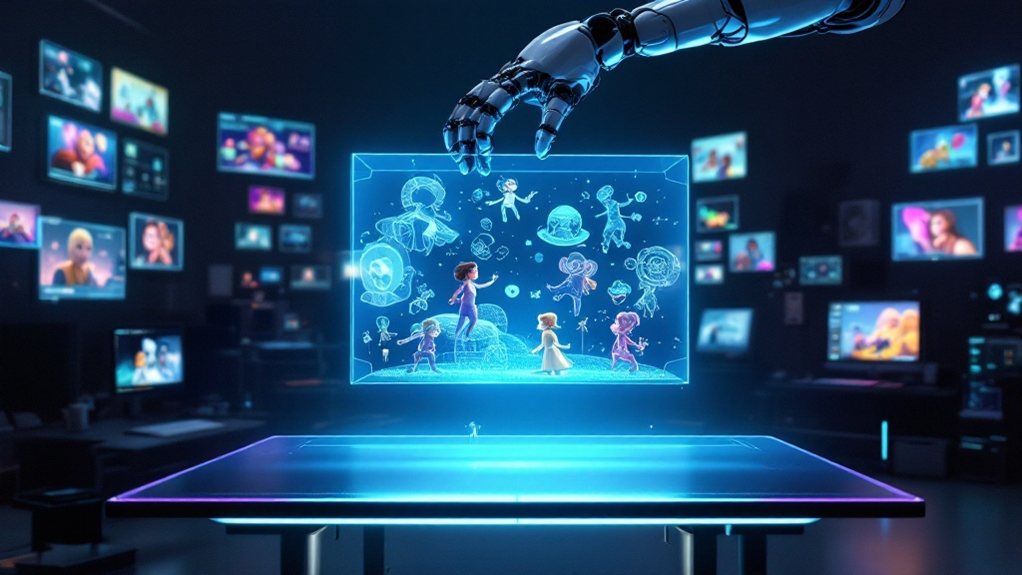AI and 5G are revolutionizing the digital landscape in dramatic ways. This powerful combo enables self-driving cars to communicate instantly, doctors to perform remote surgeries with incredible precision, and cities to manage traffic like never before. Smart systems now handle everything from emergency responses to utility management with superhuman efficiency. It’s not just fancy tech anymore – it’s reshaping how we live, work, and interact. And this is just the beginning of the transformation.

While tech buzzwords come and go, the combination of artificial intelligence and 5G networks is fundamentally reshaping our digital landscape. This isn’t just another fancy tech trend – it’s a genuine revolution that’s turning sci-fi dreams into reality. The marriage of AI and 5G creates a powerful duo that’s transforming everything from how we drive to how doctors treat patients. And yes, it’s about time.
The impact on autonomous vehicles is nothing short of remarkable. Thanks to 5G’s lightning-fast data transmission, self-driving cars can now communicate with each other and their surroundings in real-time. No more awkward pauses or delayed reactions. These vehicles are getting smarter by the minute, making split-second decisions that could mean the difference between a close call and a collision. The implementation of minimal reaction times in wireless environments is crucial for maintaining safety functions. AI algorithms enable vehicles to achieve enhanced decision making through continuous data exchange with infrastructure. Advanced AI systems in autonomous vehicles have shown potential to reduce accidents by up to 90% compared to human drivers.
5G transforms autonomous driving from science fiction to reality, enabling vehicles to think, communicate, and react with unprecedented speed and precision.
Traffic management is finally entering the 21st century, with smart systems that actually deserve the label “smart.”
Healthcare is another field getting a major upgrade. Remember those futuristic medical scenes in movies? They’re becoming real. Doctors can now perform remote surgeries with incredible precision, while AI analyzes patient data faster than any human could. It’s like having a super-intelligent medical assistant that never sleeps.
Telemedicine is no longer just a convenient option – it’s a powerful tool that can predict health issues before they become serious problems.
The urban landscape is changing too, and it’s about time. Cities are getting smarter, with AI and 5G working together to manage everything from traffic flows to emergency responses.
Imagine this: a city that actually knows when to change traffic lights or deploy emergency services without human intervention. Public transit is becoming more efficient, and resource management is finally catching up with modern needs.
Even utilities are getting a brain upgrade, leading to more sustainable urban environments. It’s not perfect yet, but it’s a massive leap forward from the clunky systems of yesterday.
Frequently Asked Questions
What Security Measures Protect Personal Data in AI-5G Integrated Systems?
Multi-layered security protocols guard personal data through encryption and authentication.
AI-powered systems constantly monitor network traffic, detecting threats in real-time. It’s not perfect, but machine learning algorithms adapt to new threats daily.
Identity management controls access rigorously – no free passes here.
Cloud security integration keeps data locked down tight, while threat intelligence teams stay vigilant against evolving cyber attacks.
How Much Will Upgrading to 5g-Compatible Devices Cost Average Consumers?
Upgrading to 5G isn’t cheap. Basic 5G smartphones start around $200, while premium models like the iPhone 16 Pro hit $1,000. Monthly service plans? Those run $60-100.
The real kicker comes from adding multiple devices – tablets, laptops, smartwatches. Sure, carriers offer trade-ins and payment plans to soften the blow, but consumers still face significant upfront costs.
At least those fancy payment plans spread the pain over 24-36 months.
Can Older Smartphones Be Modified to Work With 5G Networks?
Modifying older smartphones for 5G? Not happening.
These devices lack the essential hardware – specifically 5G modems – needed to connect to these networks. Period.
While some Android users might fiddle with settings to optimize 4G LTE connections, true 5G compatibility requires physical components that can’t be added after the fact.
Software tweaks and third-party apps promising 5G access? Pure snake oil.
What Happens to 4G Infrastructure When 5G Becomes the Standard?
4G infrastructure won’t vanish overnight.
It’ll stick around as a backup while 5G takes over, especially in rural areas where new tech rollouts are slower. Most carriers will gradually repurpose their 4G equipment, letting the networks coexist during shift.
Eventually, 4G towers and equipment will either get upgraded to 5G specs or retired completely.
But don’t worry – it’s a slow process, not a sudden switch-off.
Will Ai-Powered 5G Networks Affect Battery Life on Mobile Devices?
AI-powered 5G networks create a battery life paradox.
While 5G itself drains more power (6-11% more than 4G), AI helps offset this by optimizing network performance and resource allocation.
Modern chipsets are getting better at managing power consumption.
Still, early 5G devices struggle with battery life.
The future looks promising though – AI’s predictive capabilities and emerging technologies like graphene components could finally solve these power-hungry issues.









